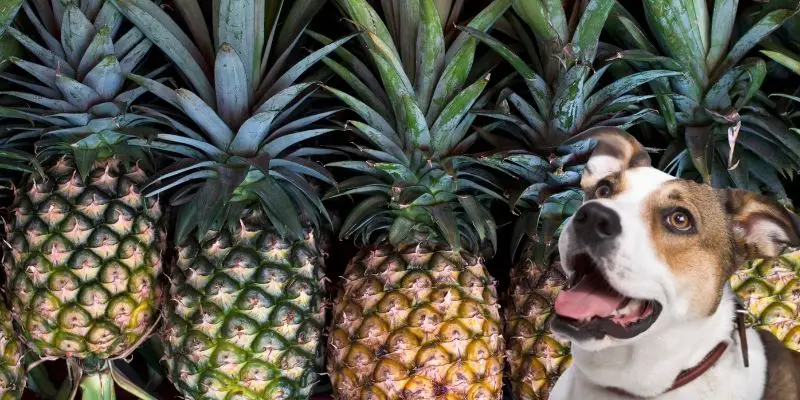Pineapple has many vitamins and minerals, including vitamin C, potassium, magnesium, and iron. But suppose your dog is following a healthy and well-balanced diet. In that case, there is no nutritional justification to feed pineapple to your pet.
But since this ingredient is getting more and more popular, we, humans, tend to put it everywhere, even in dogs’ treats. I have to look into this fruit’s place in the canines’ diet deeper. So can dogs eat pineapple? Let’s try to settle this question once and for all.
If you want to find out more about all the different nutrients your pet needs and how to feed your dog with a healthy diet, check out our in-depth guide.
Do you have a specific question about dogs and pineapples? Then use the table of contents below to jump to the most relevant section. And you can always go back by clicking on the black arrow in the right bottom corner of the page. Also, please note that some of the links in this article may be affiliate links. For more details, check the Disclosure section at the bottom of the page.
Here's what we'll cover:
- Can you give dogs pineapple? What are the benefits?
- Is pineapple safe for dogs?
- Is pineapple bad for dogs? Can it be harmful?
- Can dogs eat canned pineapple?
- How about frozen or dried pineapple?
- What parts of the pineapple can my dog eat?
- Pineapple Treats for dogs: DIY Recipe
- Does pineapple prevent my dog from eating their own poo?
- Can dogs eat pineapple?
Can you give dogs pineapple? What are the benefits?

Raw pineapple has many vitamins and minerals, e.g., vitamin C, B6, folate, and manganese.
Since pineapple is all water, it helps your dog stay calm and hydrated. This fruit is also relatively low in sugar, which makes it better than other similar fruity foods that you might be tempted to share with your pet. So all and all, not the worst human treat at all.

Is pineapple safe for dogs?
Yes, pineapple is safe for dogs to eat. But only if you share a tiny amount of the fruit with your dog. But, as with most human foods, certain precautions need to be taken. Smaller dogs can eat pineapple in small amounts compared to a large dog that can consume larger quantities to stay on the safe side.
Also, you have to remember that treats can never be a substitute for the usual nutritionally healthy diet that your pet enjoys. They’re just meant to be 10% of your dog’s daily diet.

Is pineapple bad for dogs? Can it be harmful?

It can be. At least in several ways. For instance, even though pineapple is not as high in sugars as many other fruits, it still has some. Too much sugar can lead to diabetes and weight issues in dogs. Also, since pineapple contains much dietary fiber, overeating it will cause your dog to become constipated.
This may sound counterintuitive because pet owners have been advised that dogs must have a high fiber diet.
However, fiber takes a lot of water to digest properly. And your dog might not be able to drink as much water as needed to digest fiber from pineapple.
Besides, pineapple sugar and acidity can cause tooth decay, obesity, and even diabetes. And don’t forget that some dogs are allergic to pineapples too. Those are all factors to keep in mind.

Can dogs eat canned pineapple?

Canned pineapple is not good for your dog, mainly because it typically has tons of added sugars. Therefore it can affect blood sugar levels, particularly if your dog has diabetes. Not to mention that many nutrients and enzymes will be gone from the fruit after the canning process.
However, if all you have is canned, make sure it’s sugar-free and doesn’t have artificial sweeteners. (E.g., Xylitol that is absolutely not dog-friendly). Xylitol can also be listed on the ingredients list as E 967, birch sugar, or meso-xylitol. So the best advice is never to feed your pet with canned fruits, just to keep it safe.

How about frozen or dried pineapple?
Some people give their pets frozen fruit as a cooling treat during the hot summer months. However, this would not necessarily be advised, given that hard fruit blocks can pose a major choking risk. If you plan to give your pet frozen fruit, keep a close eye on it if there is a problem.
Dried pineapple is not approved for the dog diet, even more so. As it typically has a higher amount of sugar per serving. If you end up serving it as a snack, don’t lose sight of portion size and keep it as small as possible.

What parts of the pineapple can my dog eat?

There are pieces of a ripe pineapple that we don’t consume, and this rule is just as true when it comes to dogs. Only the soft insides of the fruit are suitable for your pup to eat. Therefore, before offering the fruit, remove the skin and the rough inner pineapple heart. Eating those may create an intestinal blockage or a choking problem.

Pineapple Treats for dogs: DIY Recipe
Many dogs can’t resist the taste of sweet potatoes. This ultimate pineapple recipe blends the flavor of pineapple with the all-around sweet potato. And bringing an unusual and relatively healthy treat to your pup’s table.
The recipe is very easy to follow and includes the following steps:
- Preheat the oven to 350°F and prepare a baking tray or silicone baking sheet.
- Combine 1 sweet potato, 2 ½ cups whole wheat flour, 2 eggs, and 1/4 cup of blended frozen pineapples chunks in a large mixing bowl. Stir well after each ingredient has been added. Spoon the mixture onto the baking tray, each serving approximately the same size, to ensure that the mixture is cooked evenly.
- Bake until it’s done. If your mixture has been spooned into a portion of about half a tablespoon in size, the cooking time will be about 10 to 15 minutes.
- Once treats are cooked, wait for them to cool down and try giving them to your pup and see if he or she likes them.

Does pineapple prevent my dog from eating their own poo?
We know that many dogs will eat their poo (and there was even a study that found 1 out of 6 dogs were a “serious” poop eater). As disgusting as it is, it’s life. Some pet parents have indicated that feeding their dog pineapple has stopped this behavior. Still, it definitely does not work on every dog, and there is no real evidence of a beneficial impact.

One possible explanation of this theory is that pineapple contains bromelain, the enzyme is also present in the meat tenderizer (another additive dog owner claims that it will avoid the habit, but it is a dangerous remedy). Dog owners think that bromelain, when eaten, would make feces taste foul, decreasing the chances that a dog will consider it a yummy treat in the future. However, there’s no scientific evidence to it.
All in all, most vets agree that the most successful way to deter the dog from eating feces is to clean up immediately, leaving no poop left to eat.

Can dogs eat pineapple?
Although small amounts of raw pineapple can have small health benefits for dogs, not all pineapple parts are meant to be eaten. So only use a tiny serving of the soft flesh as a dog treat. And never the hard core or the spiked pineapple skin.
Also, you’d always prefer fresh pineapple over canned or dried one (due to the higher sugar contents).
And as with any other new food you are about to feed to your dog, keep the serving as small as possible. Especially the first time. You have to ensure that your pet doesn’t have any allergies or any adverse reaction to a new food.
If your dog ate pineapple keep a close eye on your pet for the next hour and watch for any signs of stomach distress, particularly diarrhea. And if any troubling symptoms will show up, keeping your pup miserable for more than 12 hours, consult your vet immediately.
Thanks for the blog graphics: Canva.com


